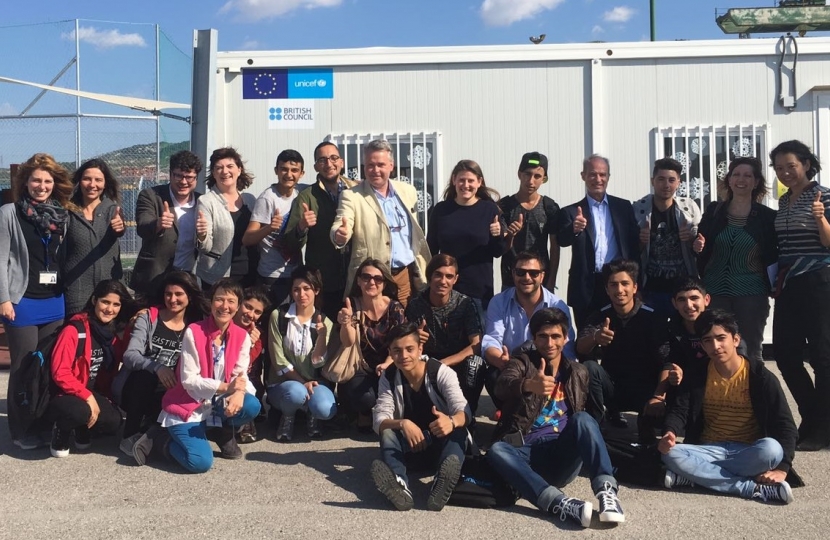
I recently visited Greece to meet children who, having fled bombs and bullets, had put themselves in the hands of smugglers to make a dangerous crossing into Europe, in a desperate act to reach the safety of their family. The children I met were smart, ambitious and optimistic, but they had been left waiting for months for slow bureaucratic processes to work to get them to their families and their futures. Nearly half of them were not in official shelters but in squats, run by the smugglers and traffickers that brought them into Europe.
Last year, over 700 unaccompanied children used the European system, known as Dublin III, to reunite with their families in the UK. Most of these reunions occurred from Calais; only nine children had been reunited with family members from Greece at the time I visited. These children had faced the most harrowing of journeys, avoiding traffickers, prostituting themselves for alleged protection and shelter, and being forced into criminal behaviour by smugglers.
The European process for family reunion is far from perfect, but it is the only legal route to the safety of close family for these children. If it weren’t for this process, those 700 children would right now be sleeping in squalor, at the mercy of traffickers and criminals gangs, rather than in the safety of their family home in the UK. With the Dubs scheme gone, it is the only real option we have for vulnerable children who have lost their parents fleeing life-threatening danger.
This is why it is so worrying to see a new paper by Unicef UK warning that the European route to family reunion is likely to be closed. Without this ever being anyone’s intention, it will essentially time out as we leave the EU. This would be a disastrous outcome for these children.
The UK Government wants to help children in the region and stop unsafe journeys through Europe – all Conservatives should – but the family reunion rules we apply to the rest of the world are more restrictive than the EU rules, meaning children will be forced to travel across these dangerous routes, risking their lives as we saw in Calais, to get to the UK to have any hope of making it to what little family they have left.
Luckily, there is the chance to fix this. In fact, we can fix it in a way that actually improves upon the European system. We can make it fairer, by ensuring that children no longer have to already be in Europe before being eligible, a situation that forces children to make those terrible journeys over the sea. We can also fix it in a way that means the UK would no longer be reliant on awaiting transfer of responsibility from other EU countries, but instead take back control and do the right thing for the world’s most vulnerable children directly from our own embassies around the world.
We could help fix all of this and make a fairer system by making a very simple change our own immigration rules. Right now, the UK rules only allow children to reunite with their parents, ignoring the reality that many of these children have lost touch with their parents due to the violence they have escaped. It is completely within our Government’s power to expand these criteria and so let these children reunite with other close family, such as adult siblings, grandparents, aunts and uncles, as is the case under the Dublin rules. Not only would this ensure that Brexit doesn’t unintentionally cut our last remaining lifeline for children stranded in Europe, but crucially, it would also put a stop to so many dangerous journeys in the first place, by allowing children to be reunited with their family directly from their regions rather than having to reach European shores before being eligible.
I recently heard the story of Nabil, aged 17, who is one child who could have been helped by this process. After bombing destroyed his home in Syria, Nabil fled to Lebanon, but several of his family had been killed and those who were alive were scattered far and wide, including his older brother living in Scotland. Boarding a plane to join his brother, however, was not an option for Nabil, as the UK immigration rules do not allow sibling family reunion. Instead, he made his way alone by land and sea to France, nearly drowning when his boat capsized in the Aegean Sea, enduring six months in the Calais Jungle before being allowed to be reunited with his brother under Dublin III. This need not have been the case if UK immigration rules applied to close family, not just parents.
I campaigned to leave the EU because I felt it would mean opportunities for our country to do things better. This is one of those opportunities where a swift, efficient UK system for ensuring family reunion for children escaping conflict regions would get children out of refugee camps or deadly boats and to the safety of a family bed.
As reproduced on ConHome: http://www.conservativehome.com/platform/2017/07/tim-loughton-brexit-offers-an-opportunity-to-make-it-safer-to-reunite-refugee-children-with-their-families.html
